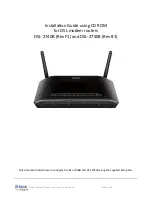
Prestige 681 SDSL Router
IPX Configuration
7-1
Chapter 7:
IPX Configuration
7.1 IPX Network Environment
Novell bundles the protocol stack, the server software and routing functionality in their NetWare server
products, so a NetWare server is not only a file or print server, it is also a router.
7.1.1 Network and Node Number
Every IPX machine has a network number and a node number, together they form the complete address of
the machine. The IPX network number is a 32-bit quantity and is usually expressed in 8 hexadecimal
digits, e.g., 0893A8CF. The host number is a 48-bit quantity and usually is taken from the MAC (Media
Access Control) address of the Ethernet hardware, so you don’t have to explicitly configure the node
number.
An IPX client obtains its network number from a server that has the network numbers statically configured.
If there are multiple servers on a network, only one server need to have the network numbers configured
and all other stations (clients and servers) can obtain the network numbers from it. The server with
configured network numbers is called a seed router.
If you have a NetWare server on the same LAN as the Prestige 681, we recommend that you set up a
NetWare server as a seed router. Even though the Prestige 681 is capable as a seed router, a NetWare
server offers a much more extensive facility for network management.
7.1.2 Frame Types
IPX can run on top of four different frame types on the Ethernet. These frame types are 802.2, 802.3,
Ethernet II (DIX), and SNAP (Sub-Network Access Protocol). Each frame type is a separate logical
network, even though they exist on one physical cable (see the following diagram).
Although there are four frame types available on the Ethernet, you should configure as few frame types as
possible on your NetWare server and use automatic frame detection on the clients to simplify management
and to reduce network overhead.
This chapter shows you how to configure the
IPX parameters of the Prestige 681.
















































